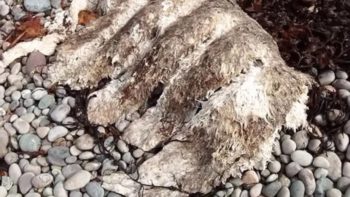
And while no one could confidently say what they were, the white pelts that remained after months of decomposing convinced some locals they were a polar bear family that somehow ended up 1,400 miles from home.
After marine experts had a chance to examine the corpses, they said they are most likely dead whales. Prior to scientific analysis, global warming alarmists chimed in and championed the false narrative that declining Arctic sea ice was decimating polar bears. But Arctic bears are actually thriving and Arctic sea ice, which is always at its lowest this time of year, is already forming as winter rolls in.
‘They are not polar bears’
Nick Davidson, who works at the government-funded Marine Animal Strandings Scheme, said they were actually either a whale or dolphin. Locals that inspected the corpses closely thought a family of polar bears got stranded on an ice floe before drowning and washing up on shore. But these ursine creatures have leg bones, and these carcasses had none.
Davidson said, “They are not polar bears. They are the remains of another species— cetaceans. Most likely a minke or pilot whale, given the size.” He said that when a mass of blubber decomposes, strands form and they look like fur. “There are no legs and no skin…and the head shape is wrong,” he added.















